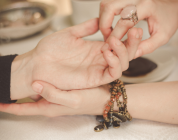Though the world often feels hostile, there are plenty of kind, sensitive people in the world. However, if you feel other people’s emotions as intensely as your own, then it may be more than just general compassion. If you were to ask psychologists about empaths, some may mention psychic folk or mind readers. Others may say that any heightened sensitivity is a result of neural pathways related to trauma or general quirks. Regardless of what others may think or believe, empaths are real and your can look for signs to see if you qualify as an empath. Knowing whether you are an empath can help you understand your tendency to say “yes” to all requests, even when you would rather say “no” or why you lie awake at night worried about people you barely know, but still feeling their pain.
Empaths can be viewed on a spectrum. This means that people who are empaths may behave in different ways. Some may be highly attuned to everyone, while others are to one or two specific individuals. They will notice shifts in behavior or energy, be sensitive to voice tones, and seemingly take on the feelings of others without trying. Other empaths, especially those who have been in an environment that has perceived or real trauma, may do this as a form of self-protection. This was a necessity in their lives because being unaware of the energy, tone, feelings, and facial expressions of others may have proven dangerous.
For those who are empaths, learning to navigate in life can be difficult. It can be tough to balance compassion and boundaries, but learning this balance is the first step to recognizing how to use empathy in day-to-day interactions. Start by taking time to acknowledge how levels of empathy affects your daily life and functioning. If you are uncertain of whether you are an empath or not, see if the following signs sound familiar.
Extreme Emotions in Certain Environments
Some empaths may get overwhelmed unexpectedly in particular settings. This may have to do with earthly events because they can feel what happens in the earth in their bodies. Things like seasonal changes, intense landmarks like volcanoes, or environmental disasters can be felt by the empath. When you feel overloaded by events like these, take some space to explore the cause or the environment. If this can be done ahead of time then the emotions may not be as overwhelming. When an empath gets triggered, they may experience mood swings, shaking, dread, and anxiety. If you have this experience, you may be an empath with more sensitivity to big earth moments.
Constant Confidante
If you are the person that everyone, including strangers, seems to confide in with disproportionate amounts when compared to others, you are likely more empathic than most. Empaths are highly intuitive by nature and thus absorb the emotions of others. They are often sought out as confidantes which can leave them getting taken advantage of by those who ignore normal boundaries. If this is you and certain people leave you feeling connected or more drained then normal, ask yourself why. If you are super sensitive to other’s feelings, then you must protect your boundaries with ferocity, especially when multiple people seem to seek you out to confide in repeatedly.
Alone Time is a Must
If you tend to immerse yourself in the feelings of others and take on the feelings of others, you also likely need a great deal of alone time. This is because all the emotions and energies can quickly become overwhelming. The alone time allows you to recharge. Because of this, many empaths are also introverts. Set up a space that makes you feel comfortable and relaxed in the environment you choose to recharge and unwind, releasing the extra emotions. Try meditating, journaling, and self-body scans to make sure you are caring for yourself. If this is something you need with regularity, you are likely an empath.
Overwhelmed in Intimate Relationships
Relationships can be tough for everyone. For empaths, intimate relationships can be especially difficult. This is because boundaries are hard to set and keep for empaths. They may spend all their time nurturing the other person while not caring for themselves. If you absorb the emotions of others, constantly listen to the problems of others, and feel overwhelmed and exhausted by all of it, this tends to be amplified in intimate relationships. This is because intimate relationships have greater vulnerability and the potential for codependency. Just because you are in an intimate relationship does not mean boundaries can be tossed out the window. Acknowledging your limitations and heightened empathy is key to maintaining your mental wellness. If this is tough for you, you may be an empath.
Large Crowds are Draining
Empaths often find large crowds overwhelming because so much is happening at once. Deciphering personal energy from that of others becomes difficult. This can be exhausting for the empath. If you are unsure your energy drain is due to being an empath, pay attention to your body, not just your brain. You may sense muscle tension, headaches, and fatigue or even sadness, irritability, and anxiety. In large groups, this may be more noticeable or come about faster.
Need to Sleep Alone
Empaths may find sleeping next to another person almost unbearable. People often run through their day as they are falling asleep, assessing how things have gone. If an empath is beside someone doing this, even just in their mind, it can be the equivalent of someone flicking the lights on and off. When you are trying to fall asleep, this type of hypervigilance can keep you from restful sleep.
Going Overboard On Helping Others
Many people go out of their way to help others, but if you go overboard to help everyone, including strangers to the point it is damaging to aspects of your life, it may be because you are an empath. If guilt is overwhelming when you say “no” to someone, empathy is behind the feeling. It can be difficult to learn to say no, but for your health and well-being, it is important. Even if you are an empath, you can have boundaries. You do not need to suffer because you are sensitive. You can say no without guilt.




